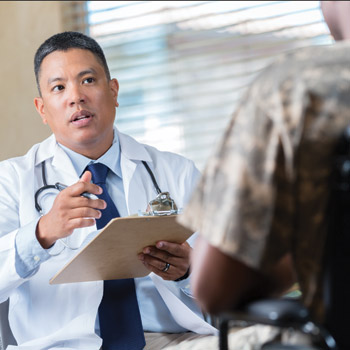Better care for patients with disability
Physicians report lacking knowledge about their legal responsibilities under the Americans with Disabilities Act (ADA) and may not be confident about their ability to provide the same quality of care to patients with disability as they do to those without it.
Sam Schroth learned firsthand how people with disability can be treated after a freak 2013 accident. Shortly after her college graduation, a large section of a dead tree fell on her while she was vacationing at a Minnesota lake.
“My perspective was drastically altered, not just literally but figuratively as well,” said Ms. Schroth, who had a T6-T7 spinal cord injury and now uses a wheelchair. “I couldn't understand why all of the sudden people treated me so differently when the only thing different was that I was much shorter than I used to be, and I had these wheels.”

Ms. Schroth, who is an MD/PhD candidate at Chicago's Northwestern University Feinberg School of Medicine, is among those medical students, researchers, and physicians who want to highlight and better address the need to improve inequities in medical care for people with disability. Nearly 27% of U.S. adults reported at least one disability in 2019, and 11.7% reported more than one, according to an analysis of federal data published Oct. 21, 2021, in JAMA Network Open. Meanwhile, a bevy of recent studies have revealed gaps and deficits in everything from physician attitudes to adherence to routine preventive screening to making practices accessible.
In a recent survey of 714 practicing U.S. physicians, published in January in Health Affairs, nearly 36% reported knowing little to nothing about their legal responsibilities under the Americans with Disabilities Act (ADA). A prior Health Affairs study, published in February 2021 and based on the same survey, found that just 40.7% of physicians reported being very confident about their ability to provide the same quality of care as they did to those without disability. The survey included seven specialties, among them general internists and family physicians.
But it was another finding—that 82.4% of physicians agreed that people with a significant disability had a worse quality of life than nondisabled individuals—that made the greatest impression on Lisa Iezzoni, MD, MSc, an author on both Health Affairs studies as well as other recent research and a professor of medicine at Harvard Medical School in Boston.
“Since there is a social desirability bias in any survey, the respondents are going to give the answer that they think the questioner wants to hear,” said Dr. Iezzoni, who was diagnosed with multiple sclerosis in 1980 and has been using a wheelchair since 1988. “That's why I feel that those 82% of physicians believed strongly that they were right, that their answer is right.”
More accommodating care
Why are physicians not very confident in their ability to provide high-quality care to patients with disability? Dr. Iezzoni points to everything from a lack of training in medical school to not having the proper facilities in their offices. Physicians “need to think about people with disabilities as a disparities population,” she said.
Another recent study that Dr. Iezzoni was involved with, published in February 2021 in Medical Care, identified disparities in treatment, specifically cancer prevention. The study, which was based on an analysis of data from a series of National Health Interview Surveys, found that women with disability were more likely to be diagnosed with breast or cervical cancer than those without. They also were less likely to get a mammogram or a Pap smear.
Amid the pandemic, people with disability appear to have been more vulnerable to SARS-CoV-2. One cross-sectional analysis, published March 5, 2021, in NEJM Catalyst, looked at COVID-19 diagnoses in nearly 65 million patients across 547 health care organizations and found that those with intellectual disability were more likely to be diagnosed with COVID-19 (3.1% vs. 0.9%) and more likely to be hospitalized (63.1% vs. 29.1%) than those without.
Tara Lagu, MD, MPH, FACP, who specializes in improving care for people with disability and has conducted research with Dr. Iezzoni, described how little of her own training focused on medical care for this population. She does not recall being taught about how to make a clinic accessible, how to transfer a patient, or the appropriate disability etiquette. The education she did receive, Dr. Lagu said, focused more on rehabilitation and efforts to fix a disability, rather than learning about disability as an identity.
“We are taught to think about disability as a bad outcome or something to avoid,” said Dr. Lagu, who directs the Center for Health Services and Outcomes Research and is a professor of medicine at Northwestern University Feinberg School of Medicine. “When you start from that lens, it is no wonder that people with disability experience their care as being different than people who don't have disability.”
For instance, don't presume that patients who live with disabling conditions are not interested in the types of therapies that would be offered to anyone else, Dr. Lagu said. “Don't assume that because someone has MS or ALS or a disease that could be progressive that they would not want, for example, cancer treatment.”
While Dr. Lagu sympathizes with the time pressures imposed on outpatient physicians, they can take steps to make their practices more open and accommodating, she said. A good start is to ask patients about any disability and related accommodations in a previsit questionnaire, ideally completed well before their arrival, she said. “If you know that they are coming, and you ask them what they need, they can tell you most of the time, and it makes your life a lot easier,” she said.
Update the office staff on the specifics of the ADA so they know, for instance, that it's their responsibility to transfer the patient and not that of the caregiver accompanying the patient to the appointment, Dr. Lagu said. (More details about how to transfer, medical equipment, exam room design, and other ADA requirements are detailed in a federal overview from the U.S. Department of Justice.)
Also stress to staff members that their attitude matters, so they don't sigh or convey a negative vibe if they must locate a room large enough to fit a wheelchair or track down a sign language interpreter, Dr. Lagu said. “Train your staff to be respectful,” she said. “Train your staff to understand that it's their job under the law.”
Dr. Lagu coauthored another study, published in October 2021 in The Joint Commission Journal on Quality and Patient Safety, that was based on the same survey of 714 physicians. It found that of the 584 physicians who cared for patients with significant mobility limitations, only 40.3% always or usually used accessible exam tables or chairs.
Such findings don't surprise Sarah Ailey, PhD, RN, a professor of nursing at Rush University in Chicago and immediate past president of the Alliance for Disability in Health Care Education, a nonprofit organization. “People who use wheelchairs will tell you that they haven't been weighed in years,” she said.
While some patients with disability can be treated within the more typical primary care time slot, physicians may have to set aside more time and be more flexible about the logistics with patients who have more complex conditions, said Clarissa Kripke, MD, a clinical professor of family and community medicine at the University of California, San Francisco. Keep in mind when scheduling that patients might rely on van services or other modes of transportation that don't always run on dependable schedules, said Dr. Kripke, who authored an overview of treatment for adults with developmental disability, published in 2018 in American Family Physician.
“You are going to need to be on time and flexible if they are late because oftentimes these systems don't work on time,” Dr. Kripke said.
Physicians should be cautious about their approach when evaluating a patient with significant disability who has experienced an acute illness, Dr. Kripke said. “One of the most common problems I find is that physicians confuse disability with illness,” she said. “They often believe people are dying when they aren't.”
If someone has significant functional limitations due to age or damage to their vital organs, then a functional assessment correlates with their prognosis relatively well, Dr. Kripke said. Alternatively, patients with a condition such as cerebral palsy may require a lot of care, but after an acute illness they tend to return to their prior function and health, she said.
“People with relatively healthy organs may develop aspiration pneumonia or bowel obstruction and they may be sick as a dog and in the ICU,” Dr. Kripke said. “But then they have a tendency, because their underlying vital organs are relatively healthy, to recover to their former baseline. Which may still be very disabled, but not sick or nearing the end of their life.”
Building rapport
Language matters, said Ms. Schroth, who cringes when she hears someone—whether it is a fellow clinician or somebody else—use the term “wheelchair bound.”
“My wheelchair, while I sit in it, I am certainly not bound to it,” she said. “It's what allows me to do the things that I want to do, and it ultimately is my freedom device more than anything else. Without it, I would be in a whole lot of hurt.”
Use person-first language, such as a “person with Tourette syndrome,” according to a primer on disability etiquette by the United Spinal Association. Avoid terms like “handicapped,” “differently abled,” and “physically challenged” and any language that implies that someone is a victim or is suffering.
When a patient has a disability, be sure to speak to that individual first, said Dr. Ailey, who has an adult son with an intellectual disability. “Don't assume they can't respond,” she said. “Even if they are nonverbal, you should talk to the person. Just because they are nonverbal doesn't mean they don't understand you.”
Moreover, individuals with significant functional impairments may not view themselves as disabled and may get quite heated at being described as such, Dr. Iezzoni said. Alternatively, others may align with their disability, such as some people in the neurodivergent community identifying as autistic, she said.
“You just need to explore with patients, ‘So how do you think about the disability that you have, or if you have a disability?’” Dr. Iezzoni said. “‘Tell me, how do you think about it?’ Really listening to people and respecting their language.”
When patients report symptoms, physicians should guard against diagnostic overshadowing, attributing new symptoms to an underlying health condition, Dr. Iezzoni said. In a review article that she authored about cancer detection and diagnosis in people with disability, published in April in The Lancet Oncology, Dr. Iezzoni described several examples of delayed diagnoses. In one case, a young woman with a spinal cord injury reported severe abdominal pain for two years, including seeking help in the emergency department. She was diagnosed each time with gastroparesis related to her injury. A mass was later found and diagnosed as Hodgkin lymphoma.
“These stories just go on,” Dr. Iezzoni said. “If you're making erroneous assumptions about a person with disability, and you really are kind of clueless about how to approach them clinically, you're going to miss things that are potentially lethal.”
Given the requirements under the ADA, outpatient physicians do need better support from the health systems that often employ them to set up scheduling systems and accommodations for patients with disability, along with investments in accessible exam tables and other medical equipment, Dr. Lagu said.
“We need the health systems to make these changes to help us care for this group of patients, but also, we have to change our attitudes, our behavior,” she said. “We have to be ready to admit that we have biases, that we have discriminated against people, and that needs to change.”



